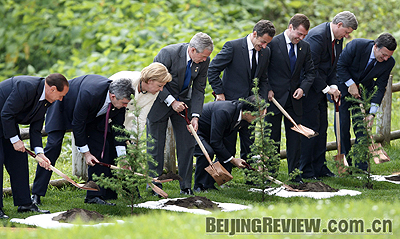|

PHOTO OPPORTUNITY: G8 leaders plant trees in the northern Japanese resort of Toyako, Hokkaido, on the sidelines of their annual meeting
The global economy. Food security. Climate change. These were some of the critical issues haunting the leaders from Group of Eight (G8) developed countries and developing countries from across the world when they met in Hokkaido, Japan, on July 7-9.
After the G8 nations--Britain, Canada, France, Germany, Italy, Japan, Russia and the United State--convened their annual summit, they held an outreach session with five major developing countries, namely China, Brazil, India, South Africa and Mexico. All these countries, as well as South Korea, Australia, Indonesia and the European Union, also had a working session on energy security and climate change.
Chinese President Hu Jintao attended the outreach session of the G8 Summit and the major economies' meeting on energy security and climate change, spelling out China's principled positions on a number of pressing issues.
China's views and proposals are so compelling and relevant that the international community cannot afford to ignore them, experts say. But China should not be expected to shoulder responsibilities beyond its capabilities, they argue.
Facing the facts
Jin Canrong, Deputy Dean of the School of International Studies, Renmin University of China, said this year's G8 Summit was held against a special backdrop: The world economy is plagued with many problems, the international influence of the United States is on the decline, and uncertain factors in international relations are increasing.
Although the G8's authority in setting the agenda for the world has declined, efforts to use this forum to make China's voice heard are conducive to the country's development, he said.
Hu put forward a four-point proposal [see sidebar] on promoting the balanced, coordinated and sustainable development of world economy at the outreach session of the G8 Summit.
|
